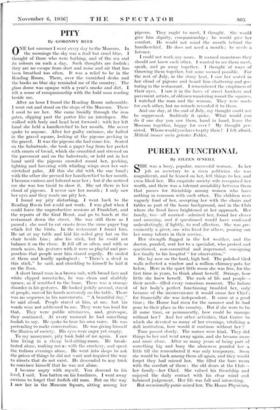PITY
By GORONWY REES
ONE hot summer I went every day to the Museum. In the mornings the sky was a frail but cruel blue. I thought of those who were bathing, and of the sea and its colours on such a day. Such thoughts are foolish ; they are no escape from dust and noise and air that has been breathed too often. It was a relief to be in the Reading Room. There, over the varnished desks and the books no blue sky reminded me of the country. The glass dome was opaque with a year's smoke and dirt. I felt a sense of companionship with the bald man reading beside me.
After an hour I found the Reading Room unbearable. I went out and stood on the steps of the Museum. There I used to see .her. She came timidly through the iron gates, slipping past the porter like an interloper. She walked with body and head bent forward ; with her left hand she held a handkerchief to her mouth. She never spoke to anyone. After her guilty entrance, she halted in the gravel square, looking at the pigeons pecking in the gravel. It was the pigeons she had come for. Seated on the balustrade, she took a paper bag from her pocket with crusts of bread, which she crumbled and strewed on the pavement and on the balustrade, or held out in her hand until the pigeons crowded round her, pecking, fighting and hovering with whirling wings over her out- stretched palm. All this she did with the one hand ; with the other she pressed her handkerchief to her mouth. I became curious and loitered near her ; but if she noticed me she was too timid to show it. She sat there in her cloud of pigeons. I never saw her mouth ; I only saw her eyes and they made me pity her.
I found my pity disturbing. I went back to the Reading Room but eould not work. I was glad when I could leave the unproductive sessions at Frankfurt, and the reports of the Graf Bcust, and go to lunch at the restaurant down the street. Shc was still there as I passed ; she used to cat crusts from the same paper bag which fed the birds. In the restaurant I found him. He sat at my table and laid his soiled grey hat on the chair beside him ; also his stick, but he could not balance it on the chair. It fell off so often, and with so much noise, his gestures with it were so playful and pur- poseless that people near him stared angrily. He smiled at them and loudly apologised : " There's a devil in this stick," he said, and chuckling to himself he laid it on the floor.
A short broad man in a brown suit, with broad face and white clipped moustache, he was clean and shabbily spruce, as if scrubbed to the bone. There was a strange disorder in his gestures. He looked jerkily around, stared at people, moved his hands nervously on the table. There was no sequence in his movements. " A beautiful day," he said aloud. People stared at him, at mc, but his words were not addressed to me. They were too loud for that. They were public utterances, and, grotesque, they continued. At every moment he had something foolish to say. He spoke to hear his own voice. He was pretending to make conversation. He was giving himself the illusion of society. His eyes were eager yet empty.
To my annoyance, pity took hold of me again. I saw him living in a cheap bed-sitting-room. He break- fasted alone, making noise; with the crockery, and spent the tedious evenings alone. He went into shops to ask the prices of things lie did not want and inquired the way to streets that do not exist. He descended to any trick to convince himself that he was not alone.
I became angry with myself. You descend to his leVel, I said. You batten on his loneliness. I went away anxious to forget that foolish old man. But on the way I saw her in the Museum Square, sitting among her pigeons. They ought to meet, I thought. She would give him dignity, Companionship ; he would give her comfort. He would not mind the mouth behind the handkerchief. He does not need a mouth ; he needs a listener.
I could not work any more. It seemed monstrous they should not know each other. I wanted to see them meet, speak, and go away together. I thought of ways of throwing them together, but none seemed possible. For the rest of July, in the stony heat, I saw her seated in her cloud of pigeons and heard him chattering and ges- turing in the restaurant. I remembered the emptiness of their eyes. I saw it in the faces of street hawkers and pavement artists, of old men wandering round the squares. I watched the man and the woman. They were made for each other, but no miracle revealed it to them.
And one day, at the end of July, my thought could not be suppressed. Suddenly it spoke. What would you do if one day you saw them, hand in hand, leave the Museum together, happy for ever ? My thought per- sisted. Whom would you have to pity then ? I felt afraid.
immer mein grosstes Felder.














































 Previous page
Previous page